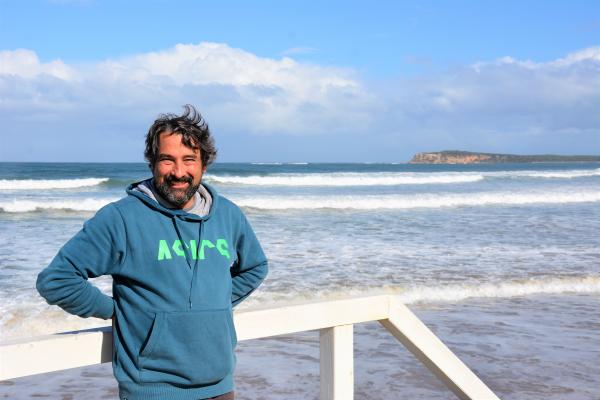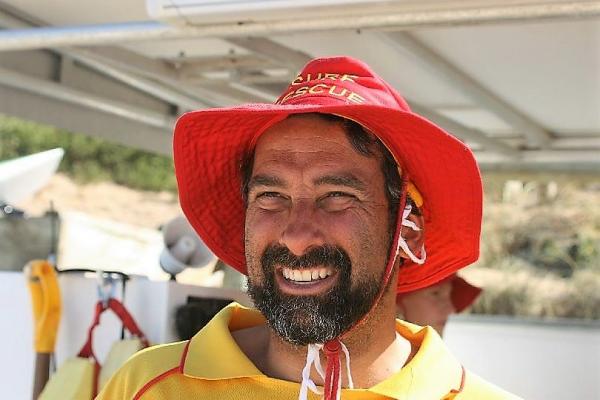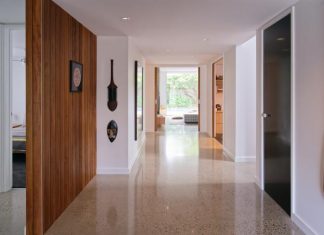Wes Prosser had a heart attack in 2008 and spiralled into two years of mental health problems. He credits the ocean with saving him and is doing all he can to pay it forward. He shares his story with JUSTIN FLYNN.
Tell me a bit about where you grew up and what sort of kid you were.
I grew up in Leopold. I didn’t do very much as a kid. Just read books and stayed home. Back in those days public transport was fairly sucky and Leopold didn’t have a lot of stuff going for it at the time.
I was a right little book nerd when I was young, still am in most regards.
I had a very boring childhood really. I went to Leopold Primary and Newcomb Secondary College.
What about after school? Did you do a degree? What do you do now?
I went to Deakin University and did a degree in mathematical science. Got involved in student politics and clubs and societies.
I’m a school teacher, a CRT (casual relief teacher). I do replacement teaching. Last term I had a four day a week contract. Before that, it might be once or twice a week, some weeks it might be nothing at all.
Covid threw the cat in amongst the pigeons in a big way because you don’t get called in to teach when there are no kids to teach.
I live in Corio with my wife Susan and my three sons Brandon, 18, Nicholas, 16, and Ethan, 14.
You had a heart attack 13 years ago. How did that change your life?
It was 2008 when I had a heart attack. I had to give up full-time work.
I stuck it out and transferred schools and did another two years but ended up with anxiety disorder, a nervous breakdown and clinically depressed.
I was told not to work for a year so I quit work altogether but right at the same time my wife had enough and said ‘I can’t. Get out. I can’t cope with you any more’.
My depression was bringing her down, somebody needed to look after the kids so she said ‘get away, just go’.
I ended up spending three years down here at Barwon Heads with my parents. I had nothing to do, was surfing every day and I got better. Better in my head, better in my body. I lost 10 kilograms just by surfing every day.
Somewhere along the road I thought this is crazy, the beach has been good to me, I need to pay the beach back somehow.
And that’s when you got involved in surf lifesaving?
One day about eight years ago I became a member here at Ocean Grove. I went down to the beach, they said ‘get a uniform, stand on the beach and save people from drowning’. Go, go, go.
The only downside was all the Bronze Medallion training had already happened. I ended up helping out with Nippers but without the Bronze Medallion I was not doing the job I envisaged I was meant to do.
One Australia Day some friends said come along to Apollo Bay. Saturdays were ‘daddy days’ then, so I took my three sons and it was going gangbusters, just so busy.
We ended up swimming at Skenes Creek. The boys jumped in the water and got sucked out by a rip.’
My mate is there and he doesn’t know how to swim. Two boys are out in the rip and the third didn’t get swept out. I got one boy on one arm and one boy on the other and I fought the rip the whole way back to shore.
I didn’t have any training yet and when I think about it, everything I did that day was wrong, but the boys were OK.
The next day I came back and said ‘I need to be trained and I need to be trained now’.
Next thing, I get into a bronze course in Torquay eight years ago and have been a patrolling member ever since.
You did the most volunteer patrol hours for Ocean Grove this season?
Most people who come to be surf lifesavers, come for their kids or because they are a competitor.
Surf lifesaving has a variety of sports within it and the profile of those sports is quite high. I was never interested in the sport, I was interested in helping the community.
With so many members in the club, only a small amount of members put (helping) as their first priority. So it becomes quite easy for me to rack up the hours.
You have to do 20 hours a year to be eligible to do the sport. Some do more than the minimum but it turns out if helping is your first priority it becomes easy to rack up the hours.
The aim is to do over 100 hours a season. That’s a benchmark I set with Life Saving Victoria.
I’m here at Ocean Grove every Sunday in season.
That’s a big commitment. Especially coming from Corio.
I love it. I choose three or four different Sundays a season and go and visit a different club and do a patrol with them instead.
Most clubs are severely understaffed. Torquay, Anglesea, they’re big clubs and have lots of people. Go down to Bancoora, Kennett River, Wye River, those sorts of places and they will take anybody who walks up.
If you’ve only got six people on patrol, one set of eyes makes a big difference.
One day I turned up at Jan Juc and every person on patrol was 17 and under. Nobody had a driver’s licence and nobody could drive the IRB (inflatable rescue boat) onto the beach because nobody could drive the ATV to the beach.
The first thing they asked me is ‘do you have a driver’s licence?’. I’ve had an amazing reception to every club I have been to.
What else do you do?
I get a lot of free time. I do a lot of community projects. I do a lot of beach clean up. I’m chairperson for the Beach Patrol, which is a community clean-up group. I’m the Geelong 3320 representative.
The idea is that you go to a place, pick up some stuff, log it, it goes to a central database and they record it and gather the information and send it off to the state government or wherever.
Their big thing at the moment is plastic. It washes up on the beach, ends up on the streets and gets into the food chain and kills things.
So if we can determine exactly how much is being picked up by people, hopefully the government does something.
I do a weed management thing out in the You Yangs. Boneseed is a plague. It’s our version of the cane toad. It chokes out the native vegetation. Nothing in Australia actually eats it, except for occasionally goats will eat the shoots, but once it becomes established nothing touches it. It seeds twice a year and just spreads. I’ve got a patch there that I try to keep weed free.
I’m also a Scout leader at 2nd Lara. It keeps me busy.
So you and Susan reconciled and you are now living as a family in Corio. Are your sons into surf lifesaving?
None of them wanted to come down and be a Nipper. I kept saying ‘come down, this is fun’.
I’m very much a loner here. There are a lot of family dynasties in surf lifesaving. I’m the walk in off the street guy. It’s very unusual.
How many people do you think you have rescued?
Dozens. I’ve been amazingly lucky I haven’t had to do a resuscitation yet. I’ve fished a heck of a lot of people out of the water.
It’s a great community of people. Lots of friends and lots of funny stories.
There’s no such thing as a safe beach, but Ocean Grove is as close as you’re going to get. I’ve done more rescues at Eastern Beach than here.
People take Ocean Grove for granted but it throws curve balls at you petty regularly. Then you go to Point Lonsdale and there’s more rocks, more rips, much more water movement. They’re doing rescues every weekend.







